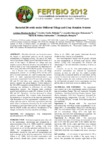Please use this identifier to cite or link to this item:
http://www.alice.cnptia.embrapa.br/alice/handle/doc/934761| Title: | Bacterial diversity under different tillage and crop rotation systems. |
| Authors: | SILVA, A. P.  BABUJIA, L. C.   MATSUMOTO, L. S.   GUIMARÃES, M. de F.   HUNGRIA, M.   |
| Affiliation: | ADRIANA PEREIRA DA SILVA, UEL; LETÍCIA CARLOS BABUJIA, UEM; LEOPOLDO SUSSUMU MATSUMOTO, UENP; MARIA DE FÁTIMA GUIMARÃES, UEL; MARIANGELA HUNGRIA DA CUNHA, CNPSO. |
| Date Issued: | 2012 |
| Citation: | In: REUNIÃO BRASILEIRA DE FERTILIDADE DO SOLO E NUTRIÇÃO DE PLANTAS, 30.; REUNIÃO BRASILEIRA SOBRE MICORRIZAS, 14.; SIMPÓSIO BRASILEIRO DE MICROBIOLOGIA DO SOLO, 12.; REUNIÃO BRASILEIRA DE BIOLOGIA DO SOLO, 9.; SIMPÓSIO SOBRE SELÊNIO NO BRASIL, 1., 2012, Maceió. A responsabilidade socioambiental da pesquisa agrícola: anais. Viçosa: SBCS, 2012. 4 p. Trab. 1752. |
| Description: | Microbial diversity can be used to assess the impact of agricultural practices on the long-term sustainability of cropping systems. The aim of this study was to investigate changes in soil bacterial diversity as a result of the impact of different soil tillage and crop rotation systems. Bacterial diversity was examined in the 0-10 cm layer in two field experiments by analyzing soil DNA using 16S rDNA PCR-DGGE profiles. Experiment 1 was a 26-year trial consisting of four soil tillage management systems: (1) no-tillage (NT), (2) disc plow (DP), (3) field cultivator (FC) and (4) heavy-disc harrow (DH), all under soybean(summer)/wheat(winter) crop succession. Experiment 2 was a 10-year trial consisting of DP and NT and three crop rotations (CR) including grasses, legumes and green manures. Cluster analysis of the 16S rDNA sequences revealed that the main effect on clustering was attributed to differences in soil tillage management systems. The Shannon index confirmed greater bacterial diversity under NT, followed by the FC, DH and DP. Therefore, diversity decreased as tillage practices intensified. The evenness index demonstrated the uniformity of the profiles of the bacterial communities with dominance of a few communities, regardless of soil tillage and crop rotation. Different crop rotations had only minor effects on bacterial diversity, but the results could be related to a previous fallow period. The results suggest that the DGGE profiles are sensitive bioindicators of the changes in bacterial diversity caused by soil tillage. |
| Thesagro: | Rotação de cultura Sistema de cultivo |
| NAL Thesaurus: | Crop rotation |
| Notes: | Fertbio. |
| Type of Material: | Artigo em anais e proceedings |
| Access: | openAccess |
| Appears in Collections: | Artigo em anais de congresso (CNPSO)  |
Files in This Item:
| File | Description | Size | Format | |
|---|---|---|---|---|
| FERTBIO1752.pdf | 191,5 kB | Adobe PDF |  View/Open |









